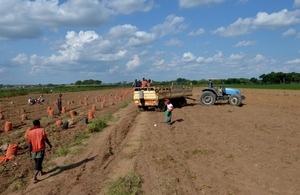CAB International (Africa) Pest Risk Information Service
Pest Risk Information Service for Ghana, Zambia, Kenya and other sub-Saharan African countries

Image of African farmers gathering potatoes and loading them onto a truck.
Project title
PRISE: Pest Risk Information SErvice
Target Country(s)
Ghana, Zambia, Kenya, plus 3 other sub-Saharan African countries
Project Lead
CABI
Project consortium
Assimila; Kings College London; Centre for Environmental Data Analysis
International partners
Plant Protection & Regulatory Services Directorate (PPSRD; Ghana); Kenya Agricultural & Livestock Research Organization (KALRO); Ministry of Agriculture, Livestock and Fisheries (Kenya); Zambia Agriculture Research Institute (ZARI).
Summary
An estimated 40% of the world’s crops are lost to pests (including insects, mites and plant pathogens), impacting on the ability of smallholder farmers to feed their families and also affecting international trade, food supply chains and hampering the pursuit of UN Sustainable Development Goals 1 and 2. This project aims to enable farmers to reduce the use of inappropriate pesticides and move towards targeted spraying. Overall this will lead to human and environmental benefits as well as reducing spend on unnecessary spraying.
Pest outbreaks are devastating; respect no political boundaries; and are increasingly unpredictable due to climate change. Innovation is essential to provide new solutions and this project combines novel Earth observation technology, satellite positioning, plant health modelling and on-the-ground real-time observations to deliver a science-based Pest Risk Information SErvice (PRISE) for sub-Saharan Africa.
This early-warning system unites the capability of the UK partners to: collect and combine disparate datasets; manipulate data using computational and modelling expertise; and leverage well-established international development networks. Commitment from Ministries of Agriculture in Zambia, Ghana and Kenya ensures their engagement and active participation. In-country data collected from the field will be fed into the system, to be used in line with the computational results, enabling iterative improvements. Appropriate communication methods will deliver risk messages and mitigation measures to users as well as collect their feedback.
Objectives
PRISE will improve the livelihoods of smallholder farmers by reducing crop losses caused by pests across six sub-Saharan African countries. This will be achieved through:
- An early warning system being created to predict the risk of pest outbreaks using cutting-edge space infrastructure, Earth Observation data and state-of- the-art modelling techniques.
- Expansive, novel crowd sourcing observations that will be established to strengthen and validate the system.
- Risk forecasts that will be integrated into existing plant health systems, leveraging on networks in current programmes and projects, to trigger appropriate action to deliver alerts, advice and inputs to farmers.
- A service that will be developed and sustained by building in-country technical capacity and interrelated business plans that engage the private sector (e.g. agro-dealers and insurance companies).
- Ministries in the countries involved being encouraged to develop policies to strengthen crop protection by the demonstration that an effective pest forecasting service can be scaled to regional and national levels.